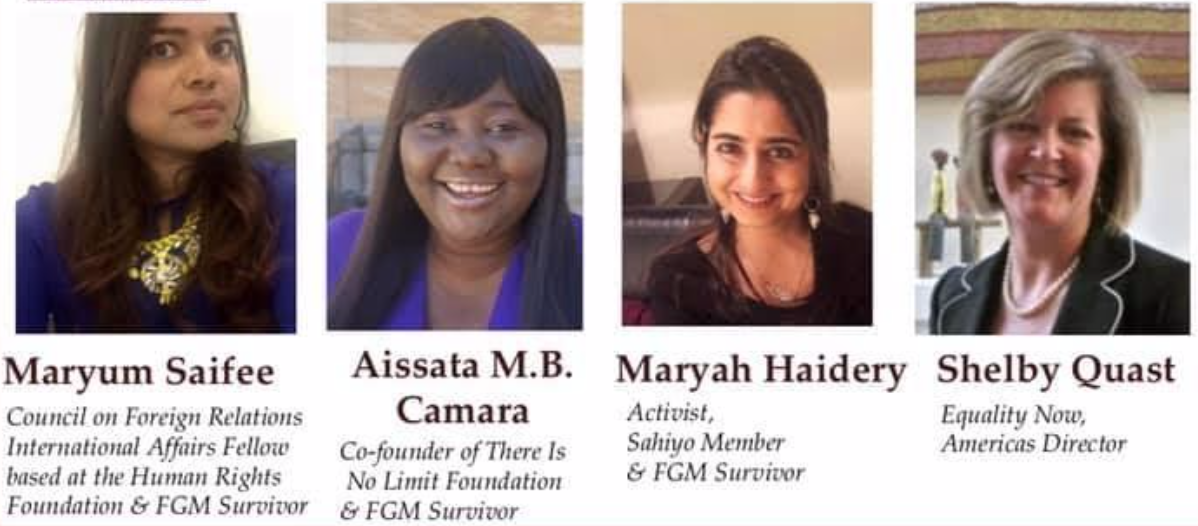By Maryah Haidery
Country of Residence: United States
Last month, the Columbia University South Asian Feminisms Alliance organized a panel discussion in New York City to discuss female genital mutilation (FGM) in the broader context of human rights. I was honored to represent Sahiyo at this panel alongside Maryum Saifee, an FGM survivor and career diplomat with the United States Foreign Service; Aissata Mounir Camara, Co-founder of the There Is No Limit Foundation; and Shelby Quast, Americas Director of Equality Now. The event was scheduled for a frigid Friday afternoon and I was only expecting a handful of people to attend. But when I finally made my way to the School of International and Public Affairs, I was pleasantly surprised to find the room was packed with students and reporters interested to hear what we had to say.
The event began with a screening of three short videos highlighting Maryum’s, Aissata’s, and my personal history with FGM. After some brief introductions, we began a very impassioned hour-long discussion about our individual experiences as activists. Maryum began by stressing that it was important to view FGM as not just a cultural or medical issue but as a fundamental violation of human rights, including the right to live a life free from violence – especially gender-based violence. Shelby was particularly insightful about the legal implications of overturning the federal constitutional ban on FGM in the Detroit case and the subsequent appeals process. Aissata was passionate about informing the audience that FGM was “not just an African problem” but a growing problem here in the U.S., and one that affects all types of women regardless of ethnicity, age, religion and socio-economic status.
Keenly aware that I was lacking the extensive background and experience of my fellow panelists, I nevertheless tried my best to represent Sahiyo by discussing some of my recent initiatives, as well as some of the issues inherent in this sort of work. In keeping with the theme of the event, I discussed the challenge of framing FGM as a human rights issue. Some people hesitate in calling FGM a violation of human rights because they view rights through the lens of cultural relativism. Cultural relativism is the idea that right and wrong is subjective and varies based on culture. According to this view, definitions of human rights based on “Western” ideas, such as the UN’s Universal Declaration of Human Rights, can only apply to people from “Western” cultures, and different standards should be used to judge the practices of people from “non-Western” cultures like Dawoodi Bohra Muslims. Unfortunately, many politicians who have this view feel that supporting a ban on FGM may appear culturally insensitive.
I told the audience that although I felt that such views were understandable and often well-meaning, they were fundamentally flawed. This is because concepts such as “right and wrong” and “human rights” are not subjective but objective. They are based on the things that humans need in order to live and flourish. While it might be true that the human rights guaranteed in the UN’s Declaration of Rights are based on “Western” ideas, they are universal and meant to apply to all humans, not just the ones born in the West. So, if you adopt a culturally relativist position and contend that universal human rights don’t extend to certain Muslim women, then you are essentially arguing that you don’t think that certain Muslim women count as “human.” It’s not hard to see why this would be wrong.
At the end of the discussion, we responded to several questions from the audience. It was heartening to see how engaged everyone was. Someone asked how important we thought changing the existing laws would be for ending FGM. I answered that while laws could be important in underscoring our nation’s commitment to protecting the rights of little girls, laws alone would probably not result in changing the culture. That is why engaging with people and educating them is also so important. Shelby emphasized that laws were helpful in bringing exposure to previously taboo practices. But she also warned that it was important to ensure that laws were implemented in ways that helped communities instead of targeting them. Several people were interested in finding out what they could do to help end the practice in their communities. Maryum urged audience members to educate themselves on the issue and pursue creative solutions. Camara agreed. “Knowledge is power,” she said. “Educate yourself. Break the silence. Find your talent and join in.” After the event, nearly everyone took home information on how they could support the various organizations represented, find upcoming Zero Day of Tolerance Activities, or sign a petition to ban FGM in Massachusetts. It was a day that seemed to exceed all expectations.

